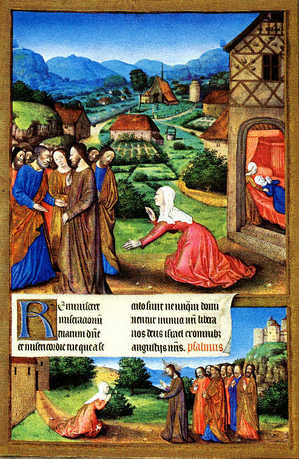O mulier, magna est fides tua
 A Favourite Antiphon
A Favourite Antiphon
This evening’s Magnificat Antiphon, taken from the gospel of the day (Matthew 15:21-28) is one for which I wait all year long. Its yearly occurrence is an occasion of grace for those who have ears to hear:
O mulier, magna est fides tua: fiat tibi sicut petisti.
O woman, great is thy faith: be it done unto thee even as thou wilt.
This is another lovely example of the gregorian melody (see the Antiphonale Monasticum, p. 350) providing exactly the right musical vesture for the body of the sacred text. It enhances the sacred text and prolongs it, without impeding its movement and its integrity.
A Eucharistic Thursday
Before considering the antiphon any further, let us look briefly at the Mass of the day. The stational church is that of San Lorenzo in Panisperna, so called because it was, in ancient times, the location of a distribution of bread (and some say ham, i.e. panini) to hungry pilgrims and to the poor. Whenever bread appears in the liturgy, even tangentially, one can expect to find allusions to the Bread of Life, a fortiori on a Thursday, the weekly rememoration of the institution of the Most Holy Eucharist. In light of this, consider today’s eucharistic Offertory and Communion Antiphons:
Offertory Antiphon: Psalm 33:8-9
Immitet Angelus Domini in circuitu timentium eum,
et eripiet eos: gustate et videte, quoniam suavis est Dominus.
The Angel of the Lord shall encamp around those who fear Him, and shall rescue them: O taste, and see that the Lord is sweet.
One might reasonably expect to find this text used as the Communion Antiphon. It is, in fact the designated Communion Antiphon for several Masses per annum, and in antiquity served as the common Communion processional. Here, however, it is sung at the Offertory. Why? Is it only because Saint Laurence, today’s titular saint, is reputed to have prayed this verse while being roasted on his grill? Or might it not also reflect the Gospel that immediately precedes it?
The Angel of the Lord
Who is the Angel of the Lord in this context? Might it not be our Lord Jesus Christ, the Angel of Great Counsel (Is 9:6) sent “to the sheep that are lost of the house of Israel” (Mt 15:24)? He is close to them that fear Him, that is, to the humble who adore Him and persevere in crying out their need. Enter the Gospel’s Chanaanite woman, coming from the coasts of Tyre and Sidon: “And behold a woman of Chanaan who came out of these coasts, crying out, said to Him, “Have mercy on me, O Lord, Thou Son of David: my daughter is grievously troubled by a devil” (Mt 15:22; also today’s Benedictus Antiphon).
The Bread of Sons
In speaking to the Chanaanite woman, Our Lord alludes to “the bread of sons” that is not to be given to the catelli, that is, to little puppies (Mt 15:26); Saint Thomas Aquinas uses this very image in his glorious sequence for the Mass of Corpus Domini, the Lauda Sion. It is, by the way, Saint Thomas, who changes the endearing catelli of the Gospel text into dogs!
Ecce Panis Angelorum,
factus cibus viatorum:
vere panis filiorum,
non mittendus canibus.
In figuris praesignatur,
cum Isaac immolatur,
agnus Paschae deputatur,
datur manna patribus.
Hail! Bread of the Angels, broken,
for us pilgrims food, and token
of the promise by Christ spoken,
children’s bread, to dogs denied!
Shown in Isaac’s dedication,
in the Manna’s preparation,
in the Paschal immolation,
in old types pre-signified.
The Sweetness of the Lord
Could not the liturgy be presenting today’s Offertory Antiphon as the thanksgiving song of the Chanaanite woman after Jesus praises her faith in Him? Christ, the Angel of Great Counsel, entered the circle of the Chanaanite woman’s anguish, and compelled by her great faith, granted her petition. Thus did she, a Gentile, taste the sweetness of the Lord reserved for the sons of the Law.
Communion Antiphon: John 6:52
The Communion Antiphon completes the eucharistic imagery of the Offertory Antiphon. It is Our Lord Himself who speaks, addressing each communicant and the whole body of the faithful as they approach the altar to partake of His Body and Blood. Here, in the Holy Sacrifice of the Mass, there are no catelli waiting for crumbs from the table, for all who are fed from the altar are sons and daughters of the New Covenant.
Panis, quem ego dedero,
caro mea est pro saeculi vita.
The bread that I will give
is My flesh for the life of the world.
At Vespers
At vespertide, the Church remembers the words of Our Lord to the Chanaanite women by singing them before and after the Magnificat. The evening sacrifice of thanksgiving ends with Jesus’ saving words addressed not only to the woman from Tyre and Sidon, but also to the woman called Ecclesia: His Bride and the Mother of the faithful:
O mulier, magna est fides tua: fiat tibi sicut petisti.
O woman, great is thy faith: be it done unto thee even as thou wilt.
